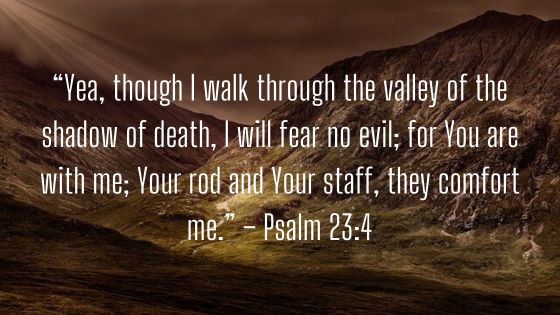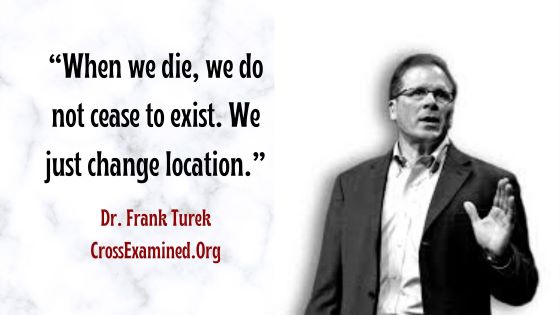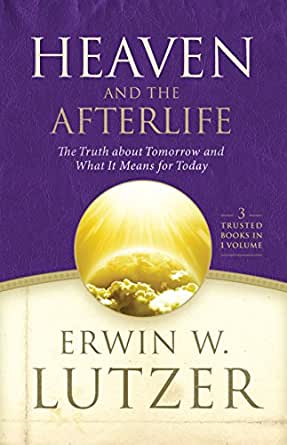Scripture tells us that this life is not all that there is. Indeed, we are beings made for eternity. Death is the doorway to eternity for each of us and this eternity will be one of conscious existence.
Needless to say, each person must be prepared. So the obvious question is, “Should we be afraid to die?” More importantly, “Should Christians be afraid of dying?”
A Natural Fear of Death
Death is an unknown for all of us. We have never been dead before and so it makes sense that all of us have a natural fear of death. Besides, eternity is a long time. Put all these factors together and you will have a natural fear or uneasiness of death.
The Bible gives us some examples of godly characters that feared death. In 2 Kings 20:1-3, we read the account of King Hezekiah.
In those days Hezekiah was sick and near death. And Isaiah the prophet, the son of Amoz, went to him and said to him, “Thus says the Lord: ‘Set your house in order, for you shall die, and not live.’” Then he turned his face toward the wall, and prayed to the Lord, saying, “Remember now, O Lord, I pray, how I have walked before You in truth and with a loyal heart, and have done what was good in Your sight.” And Hezekiah wept bitterly.
What? Hezekiah, a godly king, was afraid of dying? He sure was! Therefore, it’s not strange that we have the same type of fear.
How Christians Should View Death
While Christians do have a natural fear of death there should be no ultimate fear. Although we may have to suffer physical death because of the original sin of Adam, death eventually loses its horror as it transports the believer into a better life.
Once we understand what happens to us at the moment of death, we realize that death is not something to be feared. Although it is the separation of the spirit and the body, it is a separation into something better.
The Bible says that Jesus came to release us from the fear of death and dying in Hebrews 2:14-15.
“In as much then as the children have partaken of flesh and blood, He Himself likewise shared in the same, that through death He might destroy him who had the power of death, that is, the devil, and release those who through fear of death were all their lifetime subject to bondage.”
Notice how it says that Jesus delivers us from the fear of dying.
How then, should Christians view death? Below are several factors that need to be considered.
Death is Not the End
When we die, we do not cease to exist. Death is a transition, it is not an end. Consequently, the ultimate terror of death is removed for those who trust in the promises of the God of the Bible (Psalm 23:4).

From the Scripture passage above, believers are told that the Lord is with them when they have to face death. In one sense, they only enter the valley of the shadow of death, not the reality.
Although believers do die physically, it’s not the same separation as the unbeliever experiences in death. This is because when we die physically, we are immediately brought into the presence of the Lord. Therefore, not even death can separate the believer from the Lord (Romans 8:38-39).
Death is Not a Punishment for Christians
In Romans 8:1, Paul tells us clearly that “there is no condemnation to those who are in Christ Jesus.” It is true that the penalty for sin is death (Romans 6:23), but that penalty no longer applies to believers – not in terms of physical death, and not in terms of spiritual death.
All the penalty for our sins has been paid for by the suffering and death of our Lord. Therefore, even though we know that Christians die, we should not view their death as a punishment from God or in any way a result of a penalty due to us for our sins.
Death is the Final Outcome of Living in a Fallen World
Although death does not come to us as a penalty for our individual sins as mentioned above, it does come to us as a result of living in a fallen world, where the effects of sin have not all been removed.
We still live in a fallen world and the last aspect of the fallen world to be removed will be death (1 Corinthians 15:26). When Christ returns, then shall come to pass the saying that is written: “Death is swallowed up in victory. O death, where is your victory? O death where is your sting” (1 Corinthians 15:54-55)?
But until that time, death, as well as pain and suffering, remain a reality even in the lives of Christians. And related to the experience of death are other results of the fall that harm our physical bodies and signal the presence of death in the world.
Although God often answers prayers to deliver Christians (and also non-Christians) from these effects of the fall for a time, nevertheless, Christians eventually experience all of those things to some measure, and, until Christ returns, all of us will grow old and die.
The Citizenship of Believers is Heaven
Christians have their ultimate citizenship in heaven. Paul emphasized this truth when he wrote to the church in Philippi.
“For our citizenship is in heaven, from which we also eagerly wait for the Savior, the Lord Jesus Christ, who will transform our lowly body that it may be conformed to His glorious body, according to the working by which He is able even to subdue all things to Himself” (Philippians 3:20-21).
Although we live here on earth, our true home is with God in heaven. The Bible says we are merely temporary residents or pilgrims here. In fact, Peter addressed his first letter to these pilgrims when he wrote the following:
“Peter, an apostle of Jesus Christ, to the pilgrims of the Dispersion in Pontus, Galatia, Cappadocia, Asia, and Bithynia” (1 Peter 1:1).
Our real home is in heaven. We are only temporarily residing here.

A Genuine Hope for Something so Much Better
Consequently, we have a realistic hope for an existence that is so much better in the next life. The Bible tells us not to sorrow or grieve for the dead believers as unbelievers do for their dead. Paul made this clear when he wrote to the Thessalonians.
“And now, dear brothers and sisters, we want you to know what will happen to the believers who have died so you will not grieve like people who have no hope” (1 Thessalonians 4:13 NLT).
Notice the contrast. Believers have a genuine hope that death is not the end. Therefore, any sorrow we may experience for believers who have died is always mixed with a feeling of happiness for them. They have gone on to glory.
This is in contrast to those who have died outside of Christ who have no hope of eternal life in the presence of the Lord.
Death Completes our Union with Christ
Paul says that we are fellow heirs with Christ when we suffer with Him so that we may also be glorified with Him (Romans 8:17) and Peter encourages us to rejoice as we share in Christ’s suffering so that we may also rejoice and be glad when His glory is revealed (1 Peter 4:13).
But union with Christ in suffering includes union with Him in death as well.
“That I may know Him and the power of His resurrection, and the fellowship of His sufferings, being conformed to His death” (Philippians 3:10).
“And if children, then heirs – heirs of God and joint heirs with Christ, if indeed we suffer with Him, that we may also be glorified together” (Romans 8:17).
Do you ever wonder why God allows us to experience death, rather than taking us immediately to heaven when we become Christians? Although not every one of us will suffer and die the same way Jesus did, through death we imitate Christ in what He did and thereby experience closer union with Him.
Final Words
As human beings, we all have a normal fear of death. Although a certain anxiety about the afterlife is natural, believers in Jesus Christ should not be obsessed with the idea of death and dying. Neither should we let the fear of death keep us from being effective while we are still on earth.
The apostle Paul said there is no comparison between this life and the blessings of the next (Romans 8:18). Indeed, everything will be greater in heaven. Anything we have in this life is nothing compared to what awaits us in the next.
We should keep all these things in mind when contemplating our own death. When we do, then death will hold no ultimate fear for us as believers in the Lord Jesus Christ.
Recommended Resource: Heaven and the Afterlife: The Truth about Tomorrow and What it Means for Today by Erwin W. Lutzer
 Combining three books that together have sold nearly 1 million copies, Heaven and the Afterlife gives you Erwin Lutzer’s best reflections on eternity and what it means for you today.
Combining three books that together have sold nearly 1 million copies, Heaven and the Afterlife gives you Erwin Lutzer’s best reflections on eternity and what it means for you today.
The trilogy includes:
One Minute After You Die. A simple and moving explanation of what the Bible teaches about death, this book makes you consider a sobering truth: one minute after you die, your life will not be over. Rather, it will be just beginning—in a place of unimaginable bliss or indescribable gloom. Are you ready for that moment?
How You Can Be Sure You Will Spend Eternity with God summarizes the Bible’s teaching on salvation, answering questions like, “What role do I play in my own salvation? Can I lose my salvation if I commit a serious sin? What if I doubt that I’m saved?”
Your Eternal Rewards. This book explores the often-overlooked Scriptures about reward and judgment for Christians, answering questions like, “How will believers be judged? Do rewards for faithfulness vary? If heaven is perfect, why do rewards even matter?”
Together these books will help you live faithfully today, readying you for that final hour when you meet your Maker.

